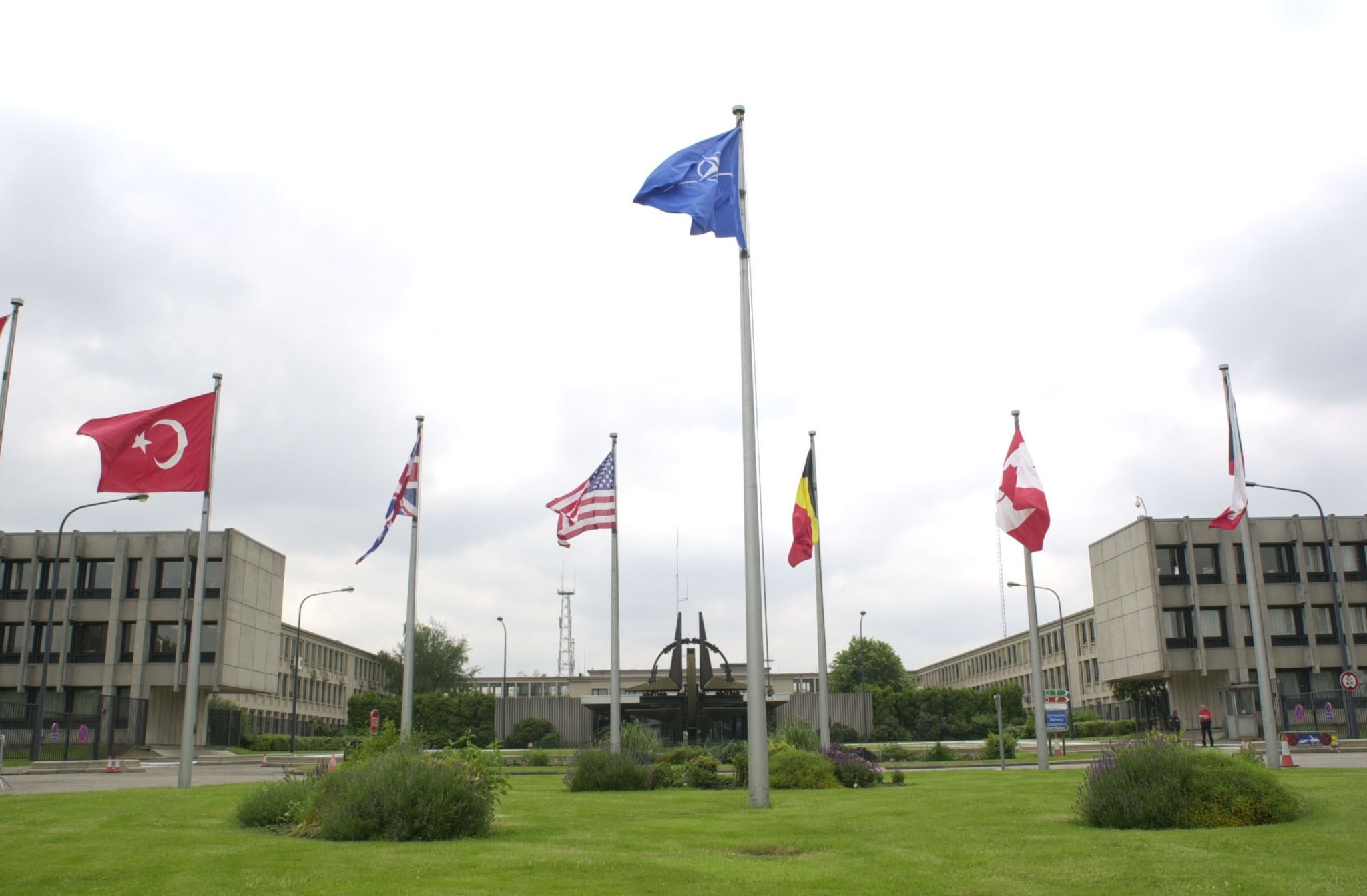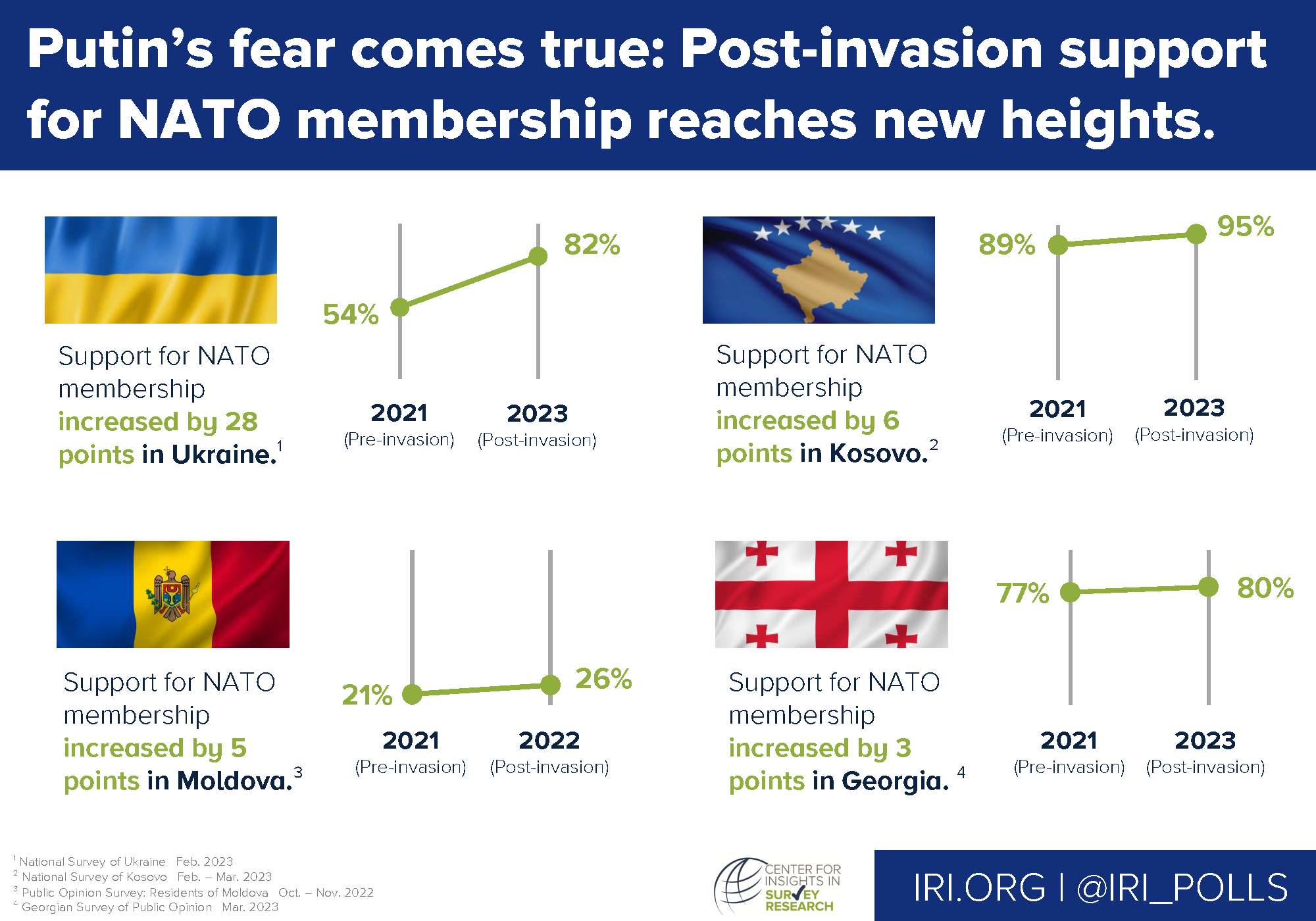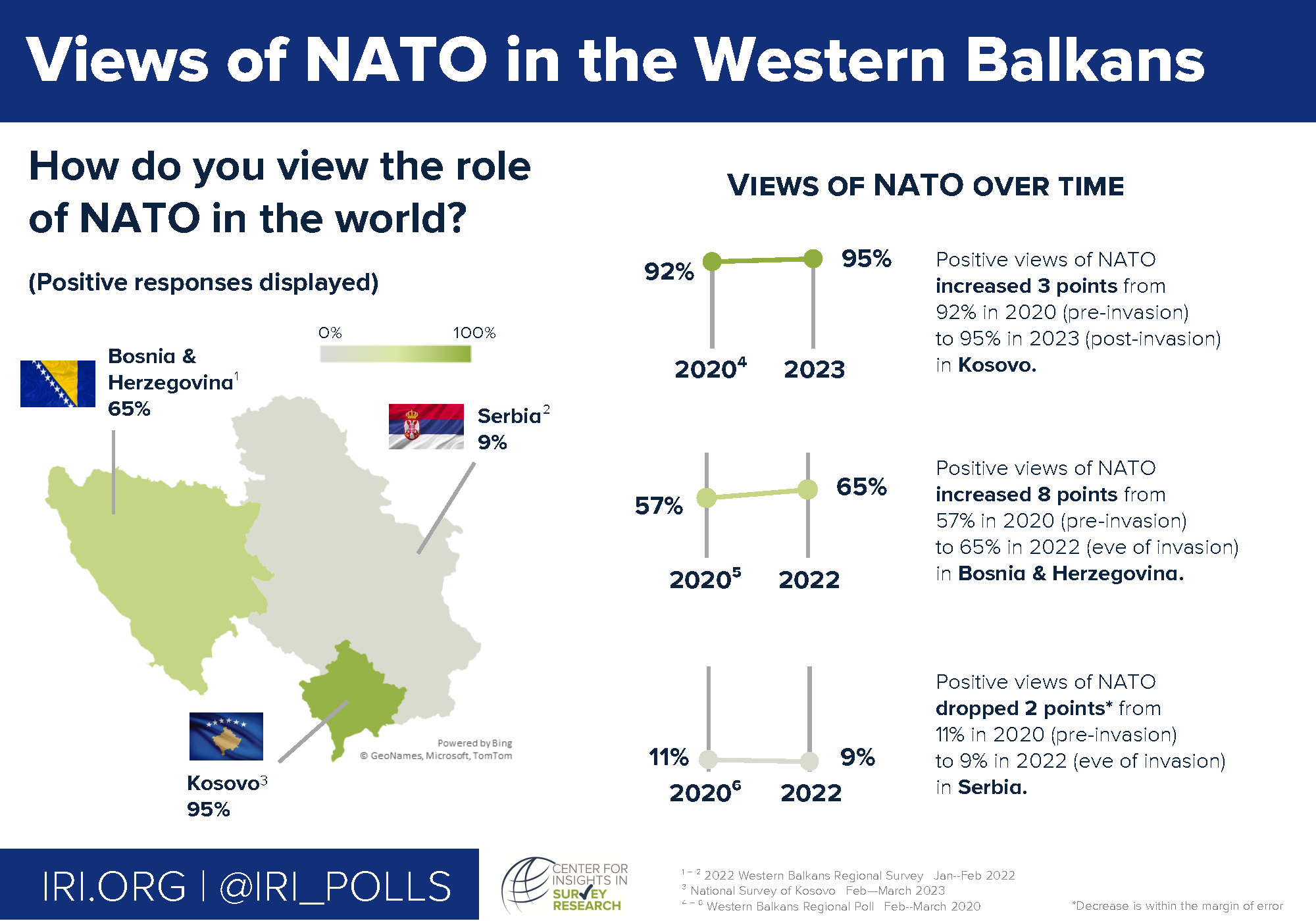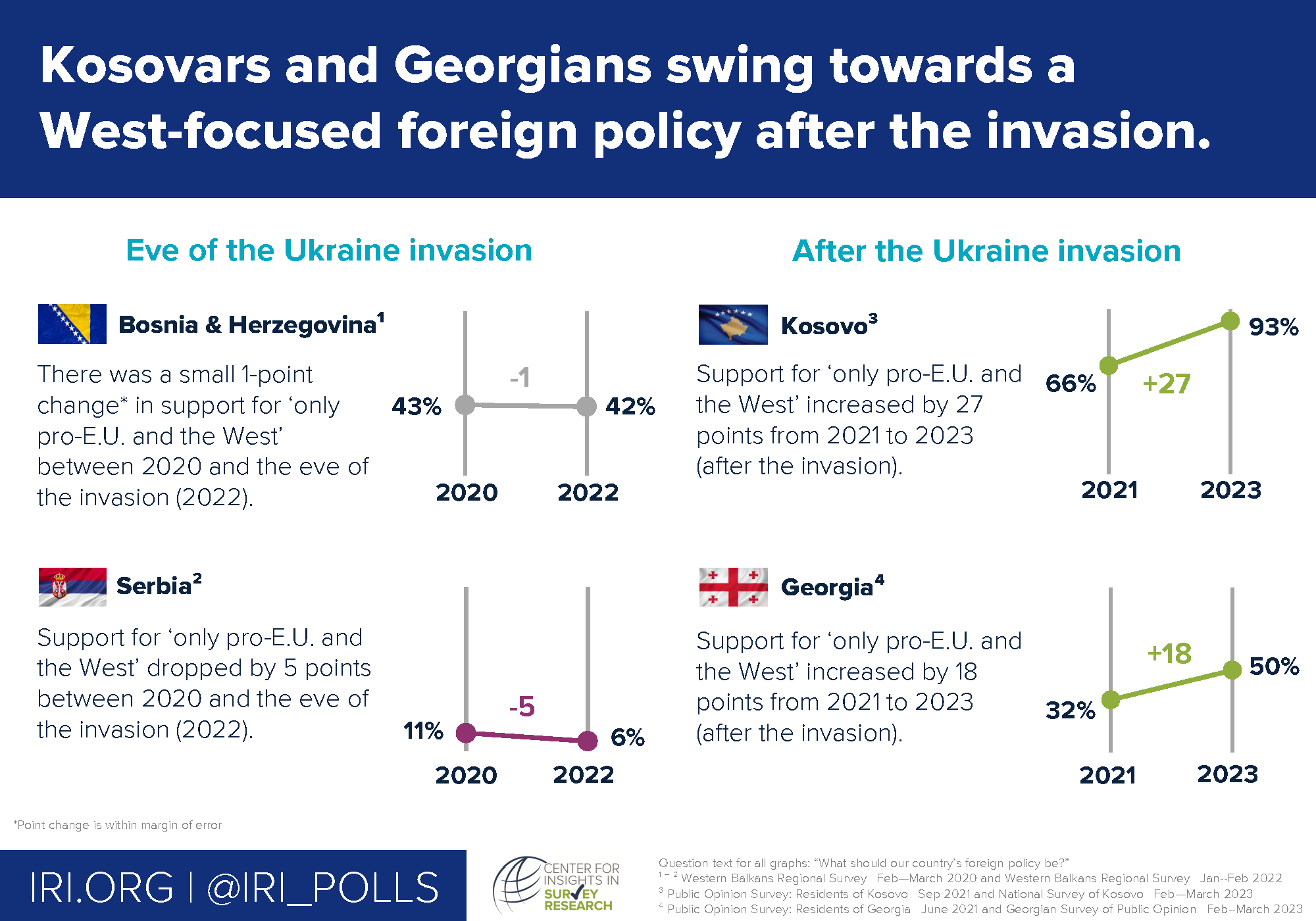
Prior to Russia’s full-scale invasion of Ukraine on February 24, 2022, further NATO enlargement seemed unlikely and the purpose of the Alliance’s continued existence itself had been called into question. Since the invasion, the outlook on NATO has shifted dramatically. With Finland’s formal accession to NATO on April 4, 2023, the Transatlantic alliance officially grew to 31 members. Now, with a consensus among NATO members reached at the Vilnius Summit in July 2023, Sweden’s accession as the 32nd member is also imminent. Ahead of these countries applying to join NATO, public opinion trends in Finland and Sweden exhibited clear shifts towards increasingly pro-NATO attitudes. IRI’s public opinion data on NATO reveals similar trends among other non-NATO countries in Europe and Eurasia when comparing pre-invasion data to figures obtained immediately prior to and after the Russian invasion. This is true of public opinion in Kosovo, Ukraine, Moldova, Georgia, and Bosnia & Herzegovina.
Post-invasion support for NATO membership reaches new heights
In Kosovo, Ukraine, Moldova, and Georgia, IRI’s polling has periodically measured support for joining the NATO alliance. IRI’s most recent post-invasion survey revealed that 95% of adults in Kosovo, 82% in Ukraine, 80% in Georgia, and 26% in Moldova would favor their countries joining NATO.[1]

Unsurprisingly, Ukrainians report the greatest increase in support for joining NATO when compared to the narrow majority (54%) who reported this view in IRI’s most recent pre-invasion survey conducted in November 2021. This amounts to a 28-point increase in support for joining NATO among Ukrainians. IRI’s survey data from Kosovo shows the next-greatest increase in support for joining NATO—95% expressed support in February/March 2023, up 6-points from 89% in September 2021. Post-invasion support for joining NATO also increased by 5-points in Moldova (26% in February 2023, up from 21% in September-November 2021), and 3-points in Georgia (80% in March 2023, up from 77% in June 2021).
Views on NATO in the Western Balkans
IRI’s polling has also measured broad favorability towards NATO in several non-member countries in the Western Balkans. Like the previous data on NATO accession, positive views of NATO also trended upwards immediately prior to and after the Russian invasion of Ukraine in Bosnia & Herzegovina and Kosovo. In Bosnia, 65% reported a positive view of NATO immediately prior to the invasion of Ukraine (December 30 – February 16, 2022). This corresponds to an 8-point increase in positivity towards NATO relative to the 57% who reported a positive view of NATO in the previous survey (February 2020). In Kosovo, 95% reported a positive view after the invasion of Ukraine (February/March 2023); a 3-point increase from the 92% who reported the same prior to the invasion (February/March 2020).

By contrast, positivity towards NATO appears to have fallen slightly in Serbia immediately prior to the invasion of Ukraine – although this shift is within the margin of error. Immediately prior to the invasion (January 4 – February 15, 2022), 9% of Serbs reported a positive view of NATO. This compares to 11% who reported a positive view of NATO in IRI’s February/March 2020 survey.
Kosovars and Georgians swing towards a West-focused foreign policy after the invasion
Finally, IRI’s polling in Bosnia, Serbia, Kosovo, and Georgia has measured whether people in these countries would prefer that their countries pursue a pro-European Union and Western foreign policy versus a pro-Russian foreign policy.[2] In Kosovo and Georgia, respondents increasingly appear to favor a pro-Western policy after the invasion of Ukraine. Post-invasion, 93% of those in Kosovo and 50% of those in Georgia stated that they would favor a foreign policy that was ‘Only pro-European Union and the West.’ Prior to the invasion, 66% of those in Kosovo and 32% of those in Georgia had stated the same: a +27-point and +18-point shift, respectively.

Respondents in Bosnia and Serbia appeared less interested in a ‘pro-European Union and Western’ foreign policy immediately prior to Russia’s invasion of Ukraine. In Bosnia, 43% favored an exclusively ‘pro-Western’ foreign policy immediately prior to the invasion, while only 6% of Serbs said the same. Relative to IRI’s 2020 surveying, this reflects stable pro-Western attitudes in Bosnia (43%), and a decrease in pro-Western attitudes in Serbia (11%).
Methods
All the data referenced in this analysis corresponds to nationally representative surveys designed and commissioned by the International Republican Institute’s Center for Insights in Survey Research on topics relating to NATO in non-member European and Eurasian countries. These surveys were collected using either face-to-face or telephone data collection methods. The surveys that were referenced include the following:
- Georgia (March 2023, face-to-face, n=1,500)
- Kosovo (Feb/Mar. 2023, face-to-face, n=1,200)
- Ukraine (February 2023, mobile phones, n=2,000)
- Moldova (Oct-Nov. 2022, face-to-face, n=1,233)
- Serbia (Jan/Feb. 2022, face-to-face, n=1,504)
- Bosnia and Herzegovina (Dec. 2021-Feb. 2022, face-to-face, n=1,501).
- Ukraine (November 2021, face-to-face, n=2,400)
- Moldova (Sept-Nov. 2021, face-to-face, n=1,619)
- Kosovo (September 2021, mobile phones, n=1,200)
- Georgia (June 2021, face-to-face, n=1,500)
- Serbia (Feb/Mar. 2020, face-to-face, n=1,481)
- Kosovo (Feb/Mar. 2020, face-to-face, n=1,517)
- Bosnia & Herzegovina (February 2020, face-to-face, n=1,486)
[1] Surveys of Kosovo, Ukraine, and Moldova asked respondents “If a referendum were held today on our country joining NATO, how would you vote?”. The survey of Georgia asked respondents “Do you support Georgia joining NATO?”.
[2] In all surveys, the question asked “What should our country’s foreign policy course be?”. Surveys of Bosnia & Herzegovina and Serbia included the response option “West and Russia equally” in addition to “Only pro-EU and the West”, “Pro-Western but keep up relations with Russia”, “Pro-Russian but keep up relations with the EU and the West”, and “Only pro-Russian”.
Top